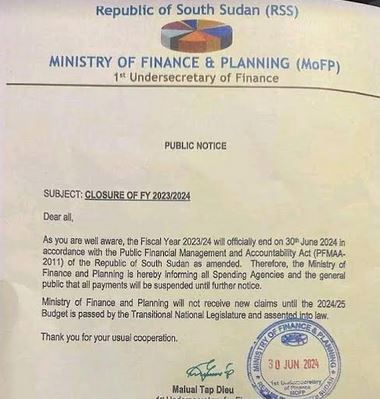The Ministry of Finance and Planning in South Sudan has taken the unprecedented step of suspending payments to government spending agencies as the fiscal year 2023/2024 came to a close on Sunday.
With no new budget tabled in parliament, civil servants have gone unpaid for months, exacerbating the economic crisis.
The country faces severe inflation, aggravated by the weakening of the national currency against the US dollar. The crisis was further compounded when a major oil pipeline, responsible for transporting 60 percent of crude oil to Port Sudan, suffered a breakdown in February 2024. Families are now struggling to afford necessities due to the sharp increase in prices.
Malual Tap Dieu, the First Undersecretary for Finance, announced the suspension of payments following the Public Financial Management and Accountability Act (PFMAA-2011) of the Republic of South Sudan.
“As you are well aware, the Fiscal Year 2023-2024 officially ends on June 30, 2024,” Mr. Tap stated in a press release. “Therefore, the Ministry of Finance and Planning hereby informs all spending agencies and the general public that all payments will be suspended until further notice.”
The ministry will not process new claims until the 2024-2025 budget is passed by the Transitional National Legislative Assembly and receives legal assent. Meanwhile, South Sudan lags behind its East African Community (EAC) partners—Kenya, Tanzania, Uganda, and Burundi—who have already presented their annual budgets, adhering to an established regional tradition.
Finance Minister Awow Daniel Chuang recently unveiled a preliminary draft of the fiscal year 2024/2025 budget, totaling 2.4 trillion South Sudanese pounds. The government anticipates that annual revenue will cover approximately SSP 1.7 trillion of the budget, leaving a deficit of 742.9 billion. While details of the draft remain undisclosed, the finance minister emphasized allocating 10 percent of the budget to the agricultural sector, recognizing it as a vital pillar of the economy.
As South Sudan grapples with economic challenges, citizens anxiously await further developments in budget negotiations and hope for stability in the months ahead.




